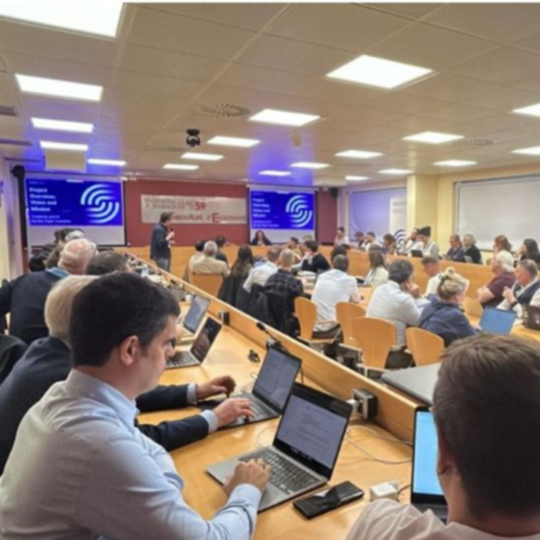Projects involving members of ARMAQoL
VETPrep
The VETPrep project (“Vocational Education and Training Participation, Retention and Educational Policies in the Wake of COVID-19”) aims to analyze and understand the challenges facing vocational education and training (VET) in Europe, especially with regard to student identification, participation, and retention. The countries involved include Croatia, Denmark, Estonia, Scotland, and Spain.
The project uses a multidisciplinary and mixed-methods approach: longitudinal data, qualitative interviews, observation of VET institutions, and co-creation workshops with relevant stakeholders.
Its specific objectives include:
- Mapping VET systems and policies at the European level;
- Comparing student trajectories before and after COVID-19;
- Identifying vulnerabilities among young people from diverse socioeconomic backgrounds;
- Formulating recommendations to increase the quality and inclusivity of VET.
NurSInCC
The NursInCC project (“Longitudinal study of internal resources for compassionate care in nursing students: consequences on burnout, fatigue, and satisfaction with compassion, well-being, and quality of care”) is a project led by Professor Laura Galiana, Noemí Sansó and Gabriel Vidal Blanco, and which is funded under the Generación de Conocimiento 2022 call from the Ministry of Science, Innovation and Universities (MCINU).
The study focuses on improving the understanding of the processes involved in compassionate care among Bachelor of Nursing students, through the application of the internal resources model developed by McGaghie et al. (2002).
With this three-wave longitudinal design, the project aims to generate evidence on the internal resources that can foster compassionate care and reduce the risk of dropout or job dissatisfaction among future nurses.
AI-SECRETT
The AI-SECRETT project (“Artificial Intelligence for Creativity, Extensions and Triple Transition Training”) addresses the need to strengthen the use of artificial intelligence (AI) for innovation and creativity in European vertical industries, in the context of the triple transition (digital, green, and social).
Among the planned activities are the implementation of a new Executive Master's in AI for Creativity, modular and hybrid training for over 700 participants, the development of MOOCs and micro-credentials, and the creation of a platform for personalized learning and competency tracking.
The project promotes the link between higher education institutions, companies, research centers, and SMEs, with the aim of expanding the practical application of creative AI solutions in sectors such as agri-food, the cultural and creative industries, energy and the environment, housing, mobility and transport, and non-tourist services.
IMPULSA
The project IMPULSA (“Promoting mental health and wellbeing through digital interventions”), led by the POLIBIENESTAR Institute for Research in Social Welfare Policies of the University of Valencia, responds to the need to advance psychological wellbeing and mental health via digital-based interventions. It builds on the understanding that wellbeing – defined as the experience of positive affect and a life grounded in values, strengths and meaning – plays a crucial role in preventing and treating mental disorders as well as distress arising from medical conditions.
The project’s objectives are two-fold: firstly, to evaluate and better understand the role of two core wellbeing components—positive affect and a values/strengths-based life; secondly, to design and validate intervention strategies that enhance these factors using technological tools, thereby ensuring their effectiveness, efficiency and impact. The interventions will target four specific populations: oncology patients, individuals with emotional or adjustment disorders, those with gambling disorder, and persons with personality disorders.
Methodologically, IMPULSA is situated within the digital mental health domain, integrating the development, deployment and evaluation of technology-based interventions that deliver broader reach, higher flexibility and better adaptability across vulnerable populations. The project runs from 2022 to 2025 (4 years). The University of Valencia bears responsibility for coordination, development and execution—reflecting a significant institutional commitment in the fields of wellbeing, mental health and technological innovation.
.
SAETA
The SAETA project (“Successful Aging in Europe: Trajectories and Processes to Act on psychological, social and physical frailty”) aims to conduct an analysis of the factors that promote healthy aging and how to address psychological, social, and physical frailty in the European population.
It is part of the Generación de Conocimiento 2021 program, supported by the Ministry of Science, Innovation and Universities (MCINU), and is led by Amparo Oliver and José Manuel Tomás.
The research model adopts a biopsychosocial and processual approach, considering that aging is the result of the interaction between biological, social, and psychological processes. Factors analyzed include health, depression, socioeconomic indicators, social support, and loneliness. The result of the research conducted by the team on this project is the book Studying Psychosocial Determinants of Aging: Methodological Contributions.
DAP 360º
The DAP 360º project (“Primary Care Determinants 360º”) aims to develop a diagnostic tool for assessing risk and child and adolescent neglect, integrating both risk and protective factors. The project is led by José Javier Navarro Pérez, Full Professor of Social Work, and includes a multidisciplinary team.
Background shows that risk assessment is often conducted in a fragmented and inconsistent manner, and the project is the result of a collaboration between the Luís Amigó Chair at the University of Valencia and the Amigó Foundation.
Its methodology has included research and pilot phases, the involvement of more than 300 professionals from the protection system, and the definition of 97 indicators distributed across blocks covering parental variables, caregiver variables, environmental variables, and protective factors. The tool allows multi-device entry, real-time data connection, and simultaneous assessment by multiple professionals, with the aim of systematizing decisions and ensuring the best interests of the child.
MESOC
MESOC is a Research and Innovation project, carried out from February 2020 to May 2023, to propose, test and validate an innovative and original approach to measuring the social value and impacts of culture and cultural policies and practices, in relation to three cross-cutting themes of the new European Agenda for Culture: 1) Health and well-being, 2) Urban and territorial renewal and 3) Citizen engagement and participation. The overall objective is to respond to the challenge posed by the H2020 call (‘Developing new perspectives and better methodologies to capture the wider social value of culture, including but also beyond its economic impact’).

 (1).jpg)
.jpg)







